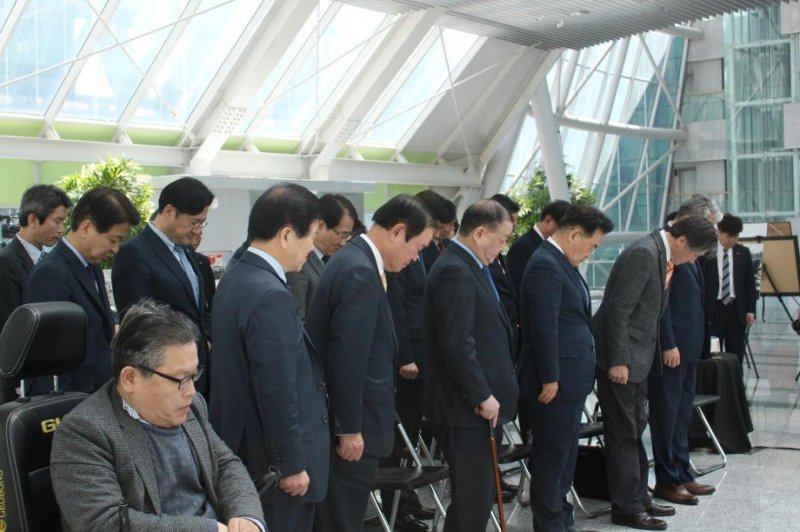1 of 3 | South Korean lawmakers honor the victims of the Jeju Massacre or uprising on Monday at the National Assembly in Seoul, South Korea. Photo by Elizabeth Shim/UPI
SEOUL, April 1 (UPI) -- Family members of South Korean victims of one of the bloodiest massacres in the country's history called for the adoption of an amendment to a special law before local lawmakers.
Song Seung-mun, born in prison to a woman tortured by anti-communist paramilitary forces in 1949, petitioned South Korean politicians on Monday to pass revisions to the Jeju 4.3 Special Law.
"Support for the amendment must continue this year," Song said, referring to the long-term effort to gain additional reparations and clear the names of victims branded as communists during military trials. "I ask lawmakers to actively support this process, so a law may be passed for [our] living parents."
The revision may be long overdue for the special law, which went into effect in 2000. Surviving victims and their families live in economic hardship and cope with psychological trauma, according to Park Jin-woo, director of the National Commission for Jeju 4.3.
"The amendment must pass," Park told UPI. "It has been 20 years."
Park said 85 percent of the 14,500 known victims were killed while detained or tortured at the hands of anti-communist police from 1948 to 1954, years that overlap with the 1950-53 Korean War. Park said his group plans to hold rallies this week to commemorate the 71st anniversary of the violent crackdown in Jeju.
Song, the activist who is also chair of the Association for Bereaved Families of 4·3 Victims, has previously said he was born to parents arbitrarily arrested and tortured by Jeju police and the paramilitary Daedong Youth Corps. Song's mother has said she was pressed down with planks of wood while pregnant.
Advocates for the amendment include Jeju Gov. Won Hee-ryong, who has complained about lawmakers dragging their feet on the revision, which has support across party lines.
On Monday, speaking at the opening ceremony of a photography exhibit chronicling Jeju activism, Won said he has high hopes for an amendment that would "relieve the burden of the victims' sorrow."
The governor, an independent conservative, said the massacre, also known as the Jeju Uprising, is a reminder of a "historical, ideological division" on the Korean Peninsula that needs to be "tidied up" so South Korea can be "prepared for unification."
Unfinished business
Won's comments mirrored earlier remarks he made in March about the need to amend the law in the spirit of "reconciliation and mutual benefit."
For some resident activists in Jeju the call for reconciliation may be too much too soon, however.
Baek Ga-yoon, co-founder of Jeju Dark Tours on the island, told UPI by phone politicians are too eager for a quick settlement of an issue where the perpetrators of violence have yet to be fully investigated.
"The [national] government and the local government want to place the massacre in the framework of reconciliation and co-existence," Baek said, adding officials are creating a narrative of forgiveness between civilian victims of the crackdown and police officers killed by armed resistance groups.
The message from Jeju officials leaves visitors and the South Korean public with the impression the island is a place of "peace." Jeju has been a long favored tourist destination for locals, and increasingly for visitors from across Asia.
"It's too early to talk about co-existence," Baek said, adding the movement for reparations is a sign it is still at the "truth and justice-seeking" stage, before closure comes with genuine forgiveness.
"Although [ex-President] Roh Moo-hyun made an official apology [in 2003], more facts need to be revealed. I feel the government wants to jump to the reconciliation process."
U.S. operational control
Baek, who informs visitors about the Jeju Uprising in guided tours, added investigations have so far failed to identify the main perpetrator of the crackdown.
While armed South Korean militia was directly involved, the U.S. military had operational control over the South Korean army, Baek said.
"That kind of killing cannot be carried out by the Korean government only," she said.
Park said his group delivered a letter to the U.S. Embassy in Seoul last year, urging Washington to take responsibility for past military actions.
In 2003, South Korea's National Committee for the Investigation of the Truth concluded the U.S. army military government and the Korean military shared responsibility for the incident.
President Moon Jae-in has said he would pursue state-level reparations.















